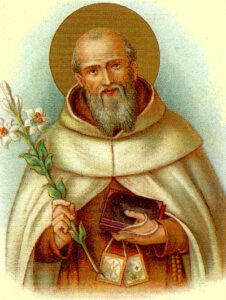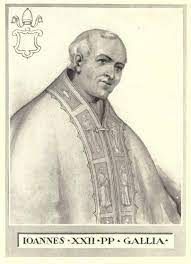The Call of Mount Carmel
The Carmelite Order traces its origins to hermits who lived on Mount Carmel in Palestine, near the traditional site associated with the prophet Elijah, in the 12th century. These hermits, inspired by the example of Elijah and Elisha and their devotion to prayer and contemplation, later formed the Carmelite Order. On Mount Carmel they erected a sanctuary to the Virgin Mary, at the same place where Elijah had seen the Cloud. They called themselves Brothers of the Blessed Mary of the Mount Carmel. They regarded Elijah as their spiritual founder.
Soon, many pilgrims began to join the Order, among them St Cyril (c. 1126 – c. 1235), St Angelo (1185-1220) and St Simon Stock (c. 1165-1265). St Cyril, often referred to as Cyril of Constantinople, was a priest and a legendary figure in the Carmelite order. St. Angelo, also known as Angelus of Jerusalem, was a convert from Judaism who became a Carmelite priest and was martyred.
In the twelfth century there were many misunderstandings against the Hermits of Mount Carmel, particularly when they transitioned from their eremitical life on Mount Carmel to Europe. These challenges stemmed from adapting to new settlements, being present alongside other mendicant orders, and a lack of understanding about their specific way of life.
St Simon Stock
 Meanwhile,, Simon Stock, an English Carmelite, suffered a lot in view of the opposition that his Order suffered in his country. On the night of 16 July 1251, at the height of his suffering, St Simon was praying hard to Our Lady; his fervent prayer was transformed into a marvellous hymn:
Meanwhile,, Simon Stock, an English Carmelite, suffered a lot in view of the opposition that his Order suffered in his country. On the night of 16 July 1251, at the height of his suffering, St Simon was praying hard to Our Lady; his fervent prayer was transformed into a marvellous hymn:
Flower of Carmel,
Tall vine blossom laden;
Splendour of heaven,
Childbearing yet maiden.
None equals thee.
Mother so tender,
Who no man didst know,
On Carmel’s children
Thy favours bestow.
Star of the Sea.
Strong stem of Jesse,
Who bore one bright flower,
Be ever near us
And guard us each hour,
who serve thee here.
Purest of lilies,
That flowers among thorns,
Bring help to the true heart
That in weakness turns
and trusts in thee.
Strongest of armour,
We trust in thy might:
Under thy mantle,
Hard press’d in the fight,
we call to thee.
Our way uncertain,
Surrounded by foes,
Unfailing counsel
You give to those
who turn to thee.
O gentle Mother
Who in Carmel reigns,
Share with your servants
That gladness you gained
and now enjoy.
Hail, Gate of Heaven,
With glory now crowned,
Bring us to safety
Where thy Son is found,
true joy to see.
Amen. (Alleluia)
The Saint prayed and sang all night. At the first sign of dawn, Our Lady appeared to him, surrounded by the angels, dressed in the habit of the Carmel. She smiled and brought in her virginal hands the Scapular of the Order, with which she clothed the man of God, saying: ‘This is a privilege for you and all the Carmelites. Whoever dies wearing this scapular shall not fall into hell.’
Of course, we cannot be carried away by the false idea that the mere wearing of a scapular is sufficient to win us Heaven. A scapular is not an amulet but a sacramental, a reminder of Our Lady’s protection and intercession. So, we must have devotion to her and live a Christian life fulfilling the Commandments!
Saturday Privilege
 In 1316, it is said that the Virgin appeared to a cardinal who, on the second day of the vision, was elected Pope bearing the name John XXII, who reigned up to 1334. She spoke to him of a Sabbatine or ‘privilege John XXII’, which was approved and confirmed by Pope Clement VII (“Ex clementi”, 12/8/1530), Pope St Pius V (“Superna dispositione”, 18/2/1566), Pope Gregory XIII (“Ut laudes”, 18/9/1577), and others, and also by the Holy Roman General Inquisition under Pope Paul V (20/1/1613).
In 1316, it is said that the Virgin appeared to a cardinal who, on the second day of the vision, was elected Pope bearing the name John XXII, who reigned up to 1334. She spoke to him of a Sabbatine or ‘privilege John XXII’, which was approved and confirmed by Pope Clement VII (“Ex clementi”, 12/8/1530), Pope St Pius V (“Superna dispositione”, 18/2/1566), Pope Gregory XIII (“Ut laudes”, 18/9/1577), and others, and also by the Holy Roman General Inquisition under Pope Paul V (20/1/1613).
Accordingly, ‘it is permitted to the Carmelite Fathers to preach that the Christian people may piously believe in the help which the souls of brothers and members, who have departed this life in charity, have worn in life the scapular, have ever observed chastity [according to one’s state], have recited the Little Hours [of the Blessed Virgin], or, if they cannot read, have observed the fast days of the Church, and have abstained from flesh meat on Wednesdays and Saturdays (except when Christmas falls on such days), may derive after death — especially on Saturdays, the day consecrated by the Church to the Blessed Virgin — through the unceasing intercession of Mary, her pious petitions, her merits, and her special protection.’ (Cf. summary approved by the Congregation of Indulgences on 4 July 1908).
(Talk delivered at Regina Angelorum Cultural Centre, Panjim)
To be concluded: 3 – Significance of the devotion for our day and age
I have learned a lot from this talk. I had not read of St Simon Stock’s beautiful prayer. Thank you Oscar.
Thank you, Laura! Hope you enjoyed the music too.